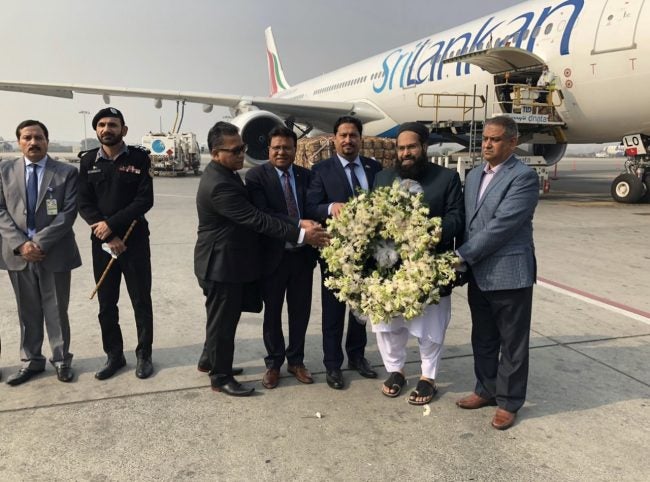The Killing of the Sri Lankan Worker: A Growing Culture of Impunity in Pakistan
Vinay Kaura
13 December 2021Summary
The brutal killing of a Sri Lankan worker in Pakistan has once again exposed the arbitrary and extrajudicial application of anti-blasphemy laws and the associated rise in Islamic fundamentalism in Pakistan. The mainstream political class and the all-powerful army have done little to mitigate the adverse effects of creeping popularity of radical Islamist parties among the masses.
The tragic death of Priyantha Kumara Diyawadana, a Sri Lankan engineer working in Pakistan’s Punjab province, has rightly jolted the liberal and secular sections of Pakistan. Diyawadana was not only beaten to death, but his body was mercilessly burnt by an irate mob, which accused him of committing blasphemy. Caught by surprise by the savagery of Diyawadana’s lynching, Pakistan’s political class, from the prime minister to the army chief, has explicitly condemned the extra-judicial vigilantism. Its civil society too seems shocked, as a succession of newspaper commentaries published in liberal English media has attempted to address the country’s dangerous drift toward religious bigotry, and what might be done to change its course. The overwhelming view is that Pakistan’s continual appeasement of religious right-wing is wrongheaded as it has made various state institutions more vulnerable to demands of Islamist parties.
The Sri Lankan national was killed by the supporters of the Tehreek-e-Labbaik Pakistan (TLP), Pakistan’s hardline Islamist party. Displaying the blindness that has become the hallmark of his government, Prime Minister Imran Khan had recently lifted an official ban on the TLP, following a secret agreement with the religious outfit. Founded in 2015, the TLP was proscribed in April 2021 after it led violent protests demanding the expulsion of the French Ambassador over blasphemous cartoons.
Diyawadana had allegedly torn a poster/sticker of the TLP on which some Quranic verses were inscribed. According to a police official, the poster of TLP was pasted on the wall adjoining the office of Diyawadana, and when some factory workers saw him removing the same, they spread the news. Angered over the blasphemy incident, the supporters of the TLP gathered outside the factory from adjoining areas and carried out the gruesome killing.
The strong official reaction to this lynching is understandable as the victim was from Sri Lanka, a South Asian country with which Pakistan shares good relations. Khan is conscious about projecting a progressive image of his country abroad, and this incident threatens to spoil the already fragile image of Pakistan. This is not the first time that a Sri Lankan has suffered extremist violence in Pakistan. Islamabad also found itself in a diplomatic blind-spot about 12 years ago. In March 2009, the Sri Lankan cricket team was attacked in Lahore’s famous Gaddafi Stadium. Some Pakistani security officers and civilians were killed, while six Sri Lankan cricketers were also injured in the terror attack. Though strong relations between Sri Lanka and Pakistan saved the ties from being adversely affected, no foreign cricket team has since visited Pakistan till South Africa broke this pattern in January 2021. New Zealand pulled out of a scheduled tour of Pakistan in September this year after a security alert.
Sri Lanka’s official reaction to the lynching of Diyawadana in Pakistan seems subdued for now as Colombo remains grateful to Islamabad for supplying much-needed military equipment to the Sri Lankan army in its war against the Liberation Tigers of Tamil Eelam. However, President Gotabaya Rajapaksa was forced to break his silence as domestic opinion turned furious. He hoped Pakistan would “ensure justice” and “the safety of the remaining Sri Lankan workers in Pakistan”. Similarly, Prime Minister Mahinda Rajapaksa expressed his shock over “the brutal and fatal attack” by “extremist mob in Pakistan”. Sri Lanka’s parliament condemned the lynching and urged the Pakistani authorities to ensure the safety of its workers.
The Pakistan government has promised swift action against the perpetrators. However, the country remains overwhelmingly conservative and after the assassination of Punjab Governor Salman Taseer in 2011 by his own bodyguard, no government has dared to reform the notorious anti-blasphemy law. Despite growing international concerns over the gross misuse of the anti-blasphemy laws to settle personal and political scores, and to legitimise violence in the name of Islam, the Pakistan state remains powerless before the street power of extremist forces and radical parties. Those supporting the anti-blasphemy law peddle a frighteningly effective propaganda for more aggressiveness and viciously vilify anyone who dares to express a view deviating from theirs. Even after the 9/11 terror attacks, when it became clear that the jihadist mindset, created and nurtured during the Afghan jihad, was an indefensible socio-political liability for Pakistan, it was not discarded completely. The normalisation of intolerance proved to be a false prophet. It has pushed the religious-minded masses into an ideological corner from which there seems no escape.
Since the security establishment emphatically believes that India poses a mortal threat to the survival of Pakistan, it is its overriding duty to resist anything that might lead to such an outcome. In fact, from 1971 onwards, when the Bangladesh war led to the break-up of Pakistan into two geographical units 50 years ago, the pursuit of anti-India policies is pretty much the sum total of Pakistan’s foreign and security policies. Its all-powerful army has devoted its entire energy to attacking India rather than eliminating the curse of Islamic extremism. The outcome is a state of paralysis and further appeasement of Islamic radicals.
. . . . .
Dr Vinay Kaura is an Assistant Professor at the Department of International Affairs and Security Studies, Sardar Patel University of Police, Rajasthan, India. He can be contacted at vinay@policeuniversity.ac.in. The author bears full responsibility for the facts cited and opinions expressed in the paper.
Photo credit: Facebook/Sri Lankan High Commision in Pakistan
-
 More From :
More From :
-
 Tags :
Tags :
-
 Download PDF
Download PDF



